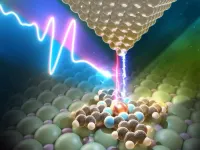(Press-News.org) Scientists at YOKOHAMA National University, in collaboration with RIKEN and other institutions in Japan and Korea, have made an important discovery about how electrons move and behave in molecules. This discovery could potentially lead to advances in electronics, energy transfer, and chemical reactions. Published in the Journal, Science, their study reveals a new way to control the distribution of electrons in molecules using very fast phase-controlled pulses of light in the terahertz range.
Atoms and molecules contain negatively charged electrons that usually stay in specific energy levels, like layers, around the positively charged nucleus. The way these electrons are arranged in the molecule is key to how the molecule behaves. This arrangement affects important processes like how light is emitted, how charges move between molecules, and how chemical reactions happen. For example, when light hits an electron and gives it enough energy, the electron moves to a higher energy level, leaving behind a positively charged “hole”. This creates an exciton – a tiny energy packet in the molecule that can emit the light. This process is key to technologies like solar cells, where excitons help convert sunlight into electricity, and LEDs, where they release energy as light.
However, there are other important states that molecules can exist in, like charged states and charged excited states. Charged states occur when a molecule gains or loses an electron, while charged excited states involve both a charge change and an electron in a higher energy level. These are important for many processes, but it has been very difficult to control these states, especially on ultrafast timescales, using traditional technology. Normally, light from the visible spectrum doesn’t provide enough energy to change the charge of the molecule and therefore cannot change the number of electrons in it.
To overcome this challenge, the researchers used terahertz light pulses, a type of light with a much lower frequency than visible light. These pulses cause electrons to move between a molecule and the metal tip of a specialized microscope that can manipulate individual molecules, allowing the team to either remove or add an electron to the molecule. This new method offers a way to control not only excitons in a controlled manner which is both quick and precise, but also other important molecular states that are essential for chemical reactions, energy transfer and many other processes. The team also demonstrated that terahertz light, which is invisible to the human eye, can be converted into visible light within a molecule, revealing a novel way to transform one type of light into another through molecular energy changes.
"While excitons typically form when light is absorbed by a material, our findings reveal they can also be created through charged states using these specially designed terahertz pulses," says Professor Ikufumi Katayama, the study’s corresponding author from the Faculty of Engineering at YOKOHAMA National University. "This opens new possibilities for controlling how charge moves within molecules, which could lead to better solar cells, smaller light-based devices, and faster electronics."
The team’s main achievement was the ability to control exciton formation at the single-molecule level. Professor Jun Takeda, another corresponding author from the Faculty of Engineering at YOKOHAMA National University, explains: "By precisely controlling how electrons move between a single molecule and the metal tip of the specialized microscope, we were able to guide exciton formation and the chemical reactions that follow. These processes usually happen randomly, but with terahertz pulses, we can determine exactly when and how reactions occur at the molecular level. This could lead to breakthroughs in nanotechnology, advanced materials, and more efficient catalysts for energy and industry."
Other contributors include Kensuke Kimura (RIKEN); Ryo Tamaki (YOKOHAMA National University [YNU], Kanagawa Institute of Industrial Science and Technology); Minhui Lee (RIKEN, The University of Tokyo [UTokyo]); Xingmei Ouyang (RIKEN); Satoshi Kusaba (YNU); Rafael B. Jaculbia (RIKEN, Institute for Basic Science); Yoichi Kawada (Hamamatsu Photonics K.K.); Jaehoon Jung (University of Ulsan); Atsuya Muranaka (RIKEN); Hiroshi Imada (RIKEN, Gwangju Institute of Science and Technology [GIST]); and Yousoo Kim (RIKEN, UTokyo, Institute for Basic Science, GIST).
###
YOKOHAMA National University (YNU) is a leading research university dedicated to academic excellence and global collaboration. Its faculties and research institutes lead efforts in pioneering new academic fields, advancing research in artificial intelligence, robotics, quantum information, semiconductor innovation, energy, biotechnology, ecosystems, and smart city development. Through interdisciplinary research and international partnerships, YNU drives innovation and contributes to global societal advancement.
END
Controlling electrons in molecules at ultrafast timescales
Scientists have found a way to control electrons in molecules using tailor-made terahertz light pulses, offering new possibilities for advanced technologies.
2025-03-06
ELSE PRESS RELEASES FROM THIS DATE:
Tropical forests in the Americas are struggling to keep pace with climate change
2025-03-06
Embargoed until 14:00 US Eastern Time, Thursday 6 March 2025
Tropical forests in the Americas are struggling to keep pace with climate change
Tropical rainforests play a vital role in global climate regulation and biodiversity conservation. However, a major new study published in Science reveals that forests across the Americas are not adapting quickly enough to keep pace with climate change, raising concerns about their long-term resilience.
The research, led by Dr. Jesús Aguirre-Gutiérrez from the University of Oxford’s Environmental Change Institute (ECI), involved over 100 scientists ...
Brain mapping unlocks key Alzheimer’s insights
2025-03-06
Researchers from The University of Texas at Arlington and the University of California–San Francisco have used a new brain-mapping technique to identify memory-related brain cells vulnerable to protein buildup, a key factor in the development of Alzheimer’s disease, an incurable, progressive brain disorder that slowly destroys memory and thinking skills.
In Texas, nearly half a million people live with Alzheimer’s disease, a form of dementia that costs the state approximately $24 billion in caregiver time, according to the Texas Department of State Health Services. Texas ranks fourth in the nation for Alzheimer’s cases ...
Clinical trial tests novel stem-cell treatment for Parkinson’s disease
2025-03-06
A recently launched Phase 1 clinical trial at Mass General Brigham is examining the safety and feasibility of a groundbreaking treatment approach for Parkinson’s disease in which a patient’s stem cells are reprogrammed to replace dopamine cells in the brain damaged by the disease. The first-of-its-kind trial of an autologous stem cell transplant, based on research and technologies invented and validated preclinically at McLean Hospital’s Neuroregeneration Research Institute (NRI), has enrolled and treated three patients at Brigham and Women’s ...
Awareness of rocky mountain spotted fever saves lives
2025-03-06
Rocky Mountain spotted fever is a bacterial infection spread by biting ticks to humans and dogs. Found on every continent except Antarctica, the infectious disease has been spreading since the early 2000s, most notably in Mexico and Brazil. Of the cases reported, more than half of infected people and dogs die.
A paper led by the University of California, Davis, highlights one of the most effective but often missing solutions to surviving this preventable, deadly disease: awareness. Most fatal cases stem from delays in diagnosis and treatment.
“The No. 1 thing that prevents human death from Rocky Mountain spotted fever is for everyone at high risk to know ...
Breakthrough in noninvasive monitoring of molecular processes in deep tissue
2025-03-06
The prestigious journal Advanced Materials recently published a groundbreaking study introducing a new method for monitoring molecular processes deep within tissue. Developed at the Technion - Israel Institute of Technology, the innovation is expected to accelerate key advancements in personalized medicine, cancer diagnosis, and early disease detection. The research was led by Prof. Hossam Haick, postdoctoral fellow Dr. Arnab Maity, and Ph.D. student Vivian Darsa Maidantchik from the Wolfson Faculty of Chemical Engineering at the Technion. The study also involved Dr. Dalit Barkan, research assistant Dr. Keren ...
BU researcher named rising star in endocrinology
2025-03-06
(Boston)—Sun Lee, MD, MSc, assistant professor of medicine at Boston University Chobanian & Avedisian School of Medicine, has been awarded an American Association of Clinical Endocrinology (AACE) Rising Star in Endocrinology Award.
The honor is presented to a physician who is within 10 years of completing their endocrine fellowship and has demonstrated actionable outcomes in outstanding leadership, teamwork and/or innovation in support of AACE’s mission to elevate clinical endocrinology ...
Stressed New Yorkers can now seek care at Mount Sinai’s new resilience-focused medical practice
2025-03-06
The Center for Stress, Resilience and Personal Growth at Mount Sinai—a first-of-its-kind initiative launched in April 2020 at the height of the COVID-19 pandemic to address its psychosocial impact on Mount Sinai Health System’s workforce—is now offering confidential behavioral health treatment services to New Yorkers generally.
A team of clinical psychologists, psychiatrists, and licensed clinical social workers from the Center is now available to individuals 18 years and older who are interested in and could benefit from behavioral health treatment. Clinical services include cognitive behavioral therapy, ...
BU researchers uncover links between metabolism and aggressive breast cancer
2025-03-06
(Boston)—More than 120 million Americans suffer from diabetes or pre-diabetes. Triple-negative breast cancer (TNBC) is the most aggressive form of breast cancer, and TNBC patients with obesity-driven diabetes often have worse outcomes.
A new study by researchers from Boston University Chobanian & Avedisian School of Medicine helps explain why this happens and suggests a potential way to improve treatment for these patients.
At present, oncologists do not consider patients with breast cancer and obesity-driven diabetes differently in any significant way from patients with breast cancer who are otherwise healthy.
The new study, "Insulin Resistance Increases ...
Engineers took apart batteries from Tesla and China’s leading EV manufacturer to see what’s inside
2025-03-06
Two main manufacturers dominate the EV (electric vehicle) market: Tesla, which is most popular in Europe and North America, and BYD, which leads the Chinese EV market. However, both manufacturers have released limited data about their batteries, so the mechanical structure and characteristics of these battery cells has remained mysterious. To compare the batteries used by each manufacturer and better understand how EV batteries function overall, a team of researchers took one of each apart.
The results publish on March 6 in the Cell Press journal Cell Reports Physical Science and show that Tesla’s batteries prioritize high-energy density and performance, ...
Paralyzed man moves robotic arm with his thoughts
2025-03-06
Researchers at UC San Francisco have enabled a man who is paralyzed to control a robotic arm through a device that relays signals from his brain to a computer.
He was able to grasp, move and drop objects just by imagining himself performing the actions.
The device, known as a brain-computer interface (BCI), worked for a record 7 months without needing to be adjusted. Until now, such devices have only worked for a day or two.
The BCI relies on an AI model that can adjust to the small changes ...
LAST 30 PRESS RELEASES:
A promising potential therapeutic strategy for Rett syndrome
How time changes impact public sentiment in the U.S.
Analysis of charred food in pot reveals that prehistoric Europeans had surprisingly complex cuisines
As a whole, LGB+ workers in the NHS do not experience pay gaps compared to their heterosexual colleagues
How cocaine rewires the brain to drive relapse
Mosquito monitoring through sound - implications for AI species recognition
UCLA researchers engineer CAR-T cells to target hard-to-treat solid tumors
New study reveals asynchronous land–ocean responses to ancient ocean anoxia
Ctenophore research points to earlier origins of brain-like structures
Tibet ASγ experiment sheds new light on cosmic rays acceleration and propagation in Milky Way
AI-based liquid biopsy may detect liver fibrosis, cirrhosis and chronic disease signals
Hope for Rett syndrome: New research may unlock treatment pathway for rare disorder with no cure
How some skills become second nature
SFU study sheds light on clotting risks for female astronauts
UC Irvine chemists shed light on how age-related cataracts may begin
Machine learning reveals Raman signatures of liquid-like ion conduction in solid electrolytes
Children’s Hospital of Philadelphia researchers emphasize benefits and risks of generative AI at different stages of childhood development
Why conversation is more like a dance than an exchange of words
With Evo 2, AI can model and design the genetic code for all domains of life
Discovery of why only some early tumors survive could help catch and treat cancer at very earliest stages
Study reveals how gut bacteria and diet can reprogram fat to burn more energy
Mayo Clinic researchers link Parkinson's-related protein to faster Alzheimer's progression in women
Trends in metabolic and bariatric surgery use during the GLP-1 receptor agonist era
Loneliness, anxiety symptoms, depressive symptoms, and suicidal ideation in the all of us dataset
A decision-support system to personalize antidepressant treatment in major depressive disorder
Thunderstorms don’t just appear out of thin air - scientists' key finding to improve forecasting
Automated CT scan analysis could fast-track clinical assessments
New UNC Charlotte study reveals how just three molecules can launch gene-silencing condensates, organizing the epigenome and controlling stem cell differentiation
Oldest known bony fish fossils uncover early vertebrate evolution
High‑performance all‑solid‑state magnesium-air rechargeable battery enabled by metal-free nanoporous graphene
[Press-News.org] Controlling electrons in molecules at ultrafast timescalesScientists have found a way to control electrons in molecules using tailor-made terahertz light pulses, offering new possibilities for advanced technologies.




